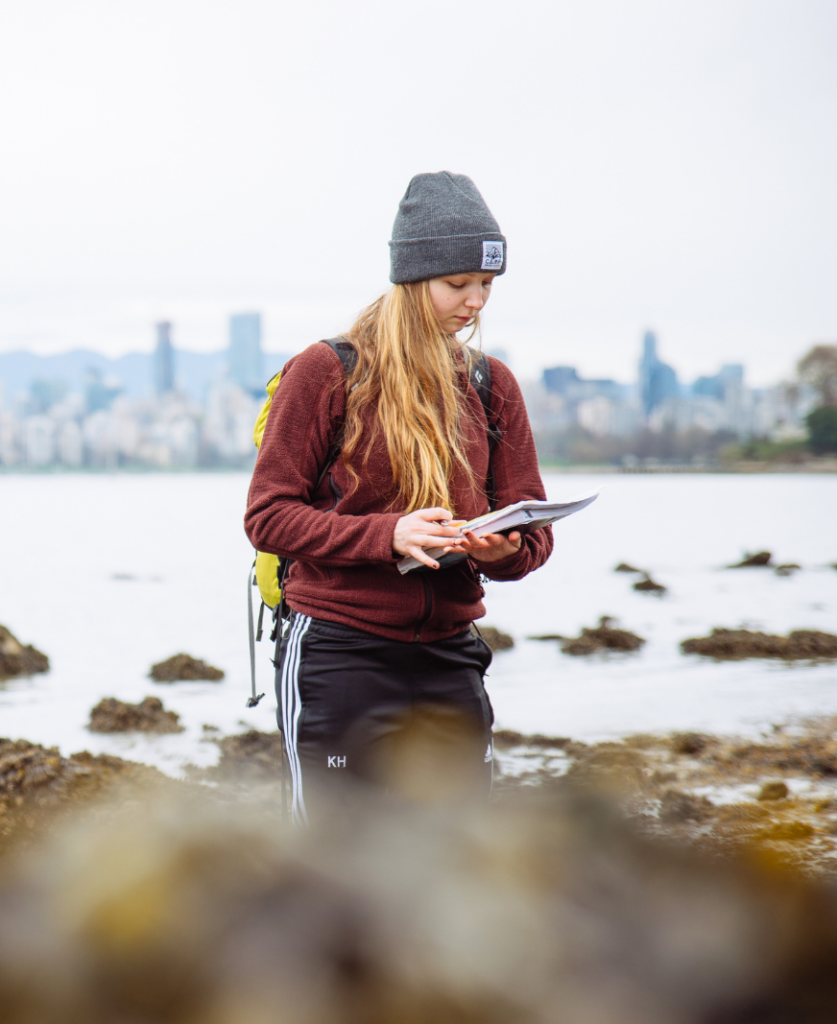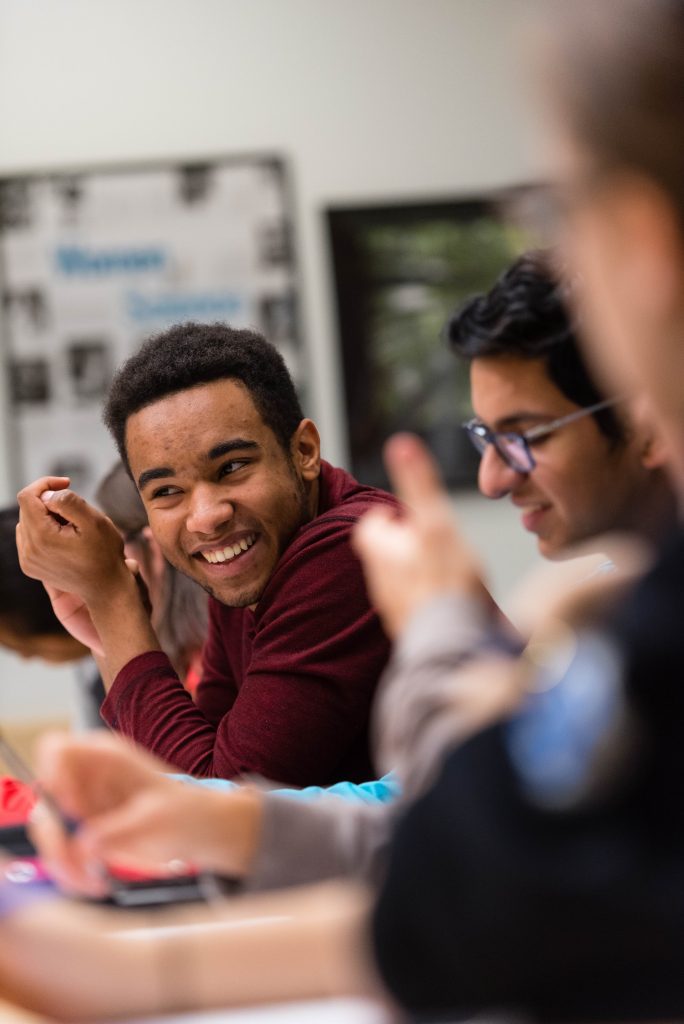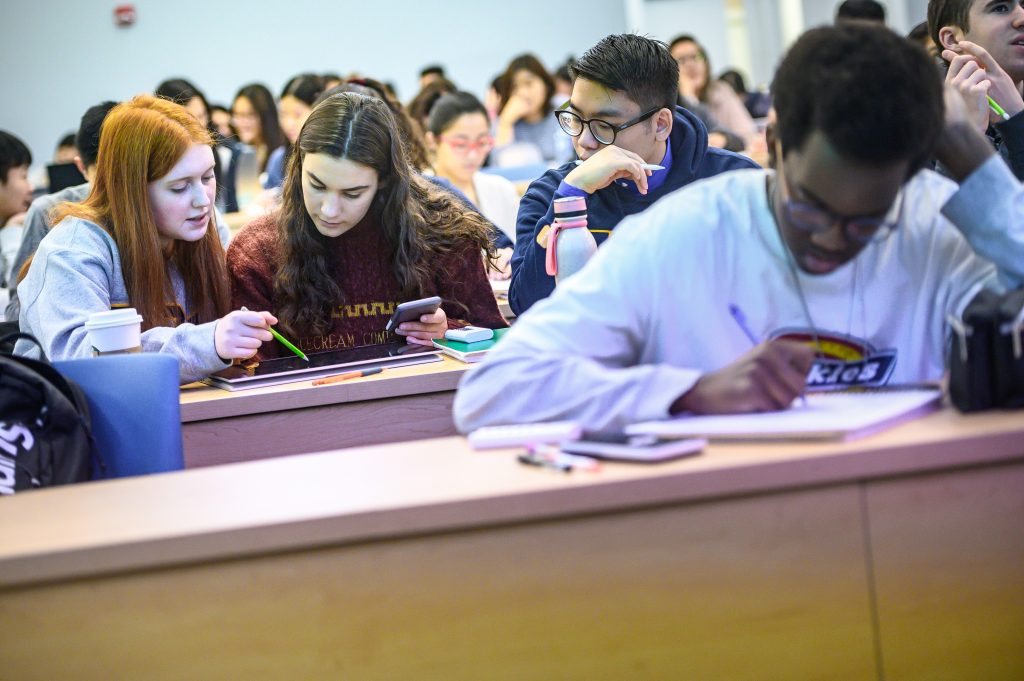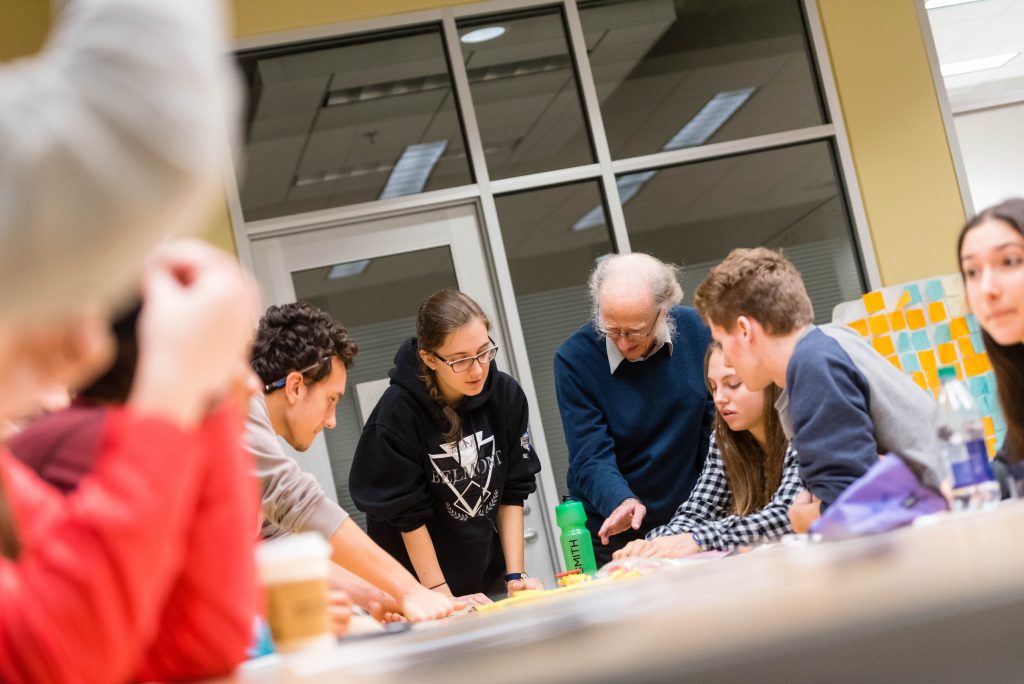ARTS VSP BY THE NUMBERS
1900+
STUDENTS
10
YEARS
offering an unforgettable educational experience
35+
NATIONALITIES
represented by our students
The Arts VSP offers a variety of packages with courses in the fields of humanities, social sciences, and the creative and performing arts. Each package is comprised of two courses of approximately 39 hours of instructional time per course. Students will earn a certificate and a grades letter* upon successful completion at the end of the program.
*Grades letters are not official UBC transcripts. VSP courses do not receive UBC credit, but credit may be granted by the students’ home institution at their discretion.
Course Packages, June Session (June 5 – July 5, 2026)
ARTS B JUNE: Global Journalism, Culture and Communications: Practice and Principles
Anthropology and Journalism, Writing, and Media
Culture and Communication (Department of Anthropology)
This introductory course provides an anthropological perspective on how language, as a common human condition, shapes social life. In exploring the intertwined relationship between language and culture, the class will introduce the foundational concepts and methods used in anthropology to study patterns of communication and socio-cultural practices. Language is a substantial force in formulating cultural beliefs, ideologies, categories of social identity, community memberships, and power relations. After taking this course, students will be well-equipped to answer questions such as: What is language and how does it shape our social worlds? How can linguistic theories help us grasp cultural phenomena? How do people use language to form their identities? And how do various societal factors influence intercultural communication? Students will gain an understanding of the relationship of language to their own and other cultural contexts.
Global Journalism (School of Journalism, Writing, and Media)
This course will examine the development of media technologies, their applications, and their cultural, political and social impacts. Students will also gain hands-on experience in learning how to think and operate like a professional journalist in a simulated multimedia environment. It is designed to introduce students to the grammar and syntax of media across platforms, based on a core journalistic skill set of interviewing, reporting, news writing, and research methods in tandem with the most current technical tools and technologies in digital media.
Course Packages, July Session (July 17 – August 17, 2025)
ARTS A JULY: From Stage to Screen: How Vancouver Plays to a Global Audience
Theatre and Film
From Drama to Theatre: How Does a Play Mean? (Department of Theatre and Film)
This course will explore the languages of theatre within Vancouver’s rich and lively performance culture. How do individual artists–directors, actors, designers–transform a playwright’s ideas into unique and original art? In what ways, for example, will a Shakespeare play produced in Vancouver become a Canadian play? These questions and more will be explored in relation to three plays in production in Vancouver during the term. We will examine and discuss the play scripts, attend the plays, and meet “backstage” with some of the artists themselves. Plays chosen will span a variety of genres, including Shakespeare (in production at Bard on the Beach Shakespeare Festival), musicals (in production at Theatre Under the Stars and the Arts Club Theatre Company), plus additional dramas and comedies in production.
Documentary and the City (Department of Theatre and Film)
For the first time in human history a majority of the world live in cities. While there are multiple threats posed by the growth of cities, such as poverty, migration, and social divisions, there are also surprising and innovative practices that emerge. The city of Vancouver is brimming with stories that can tell us many things about the world we live in. Focusing on documentary films and film making, this course introduces students to these often hidden stories of the city through key writings, films, and direct engagement with life in Vancouver. Students will use creative methods to connect critical analysis with their everyday experiences, while authoring basic documentary projects in neighbourhoods throughout the city.
ARTS B JULY: Global Journalism, Culture and Communications: Practice and Principles
Anthropology and Journalism
Culture and Communication (Department of Anthropology)
Anthropology is the study of what makes us human. One of the most fundamental aspects of human society is communication through language. In this course, we ask if human language is unique and different from communication systems of other animals. We also examine the relationship between language and culture and explore how language is linked to how we see the world and how we relate to each other. By reading about a variety of cultures and languages across the globe, we will try to answer questions, such as: Do we see the world differently because we speak different languages? Do we identify the social characteristics of an individual based on their dialect and accent? How do people use language to form or change identities? Why are women criticized more frequently than men for how they communicate? You will gain experience in meeting writing standards for UBC Arts/Anthropology courses and will receive individual feedback on writing assignments.
Global Journalism (School of Journalism, Writing, and Media)
This course will examine the development of media technologies, their applications, and their cultural, political and social impacts. Students will also gain hands-on experience in learning how to think and operate like a professional journalist in a simulated multimedia environment. It is designed to introduce students to the grammar and syntax of media across platforms, based on a core journalistic skill set of interviewing, reporting, news writing, and research methods in tandem with the most current technical tools and technologies in digital media.
ARTS C JULY: International Finance, Trade, and the Growth of Global Economies
Economics
International Trade and Financial Markets (Vancouver School of Economics)
The modern global economy is intricately tied together through networks of trade and financial interconnections. This course will give students an understanding of the structure and functions of international trade and international financial markets. The course will give a basic introduction to the forces driving international trade in goods and financial assets among nations of the world. The major theories of international trade and financial markets will be reviewed. Topics covered will include the determinants of a country’s trading patterns, recent trends in international trade such as offshoring and global supply chains, the role of financial markets in international development, the future of the Renminbi as an international currency, the understanding of international financial crises, and sovereign debt crises.
Global Economic Growth: From Ancient Civilizations to the Industrial Revolution (Vancouver School of Economics)
Why do some societies struggle while others prosper? For several millennia, most people around the world barely earned enough to survive. Starting in the eighteenth century, however, several countries broke this pattern, allowing a large and increasing fraction of the world’s population to enjoy higher standards of living. This course is an attempt to answer the enduring question “What sparks and sustains economic growth?”
We will explore why Europe was the region where the Industrial Revolution first took place, and what prevented other promising attempts from coming to fruition. We will look as far back as the Neolithic Revolution in search for the institutional, geographical, and cultural roots of the global growth experience. Students will contrast different interpretations and critically analyze the advantages and shortcomings of each approach, in a quest to understand how the history of global development can help unlock the pressing economic challenges of our age.
ARTS D JULY: Making Sense of the World in Chaos: Global Order, AI, Climate Change, and Planetary Future
Political Science
Ordering Chaos: Global Order and AI Governance (Department of Political Science)
The Global Economic Order is fraying. AI is challenging all political institutions. What is driving this change? And what are pathways for dealing with this once-a-century transformation?
The course explores how the global system really works and how rules are made to regulate trade, deal with economic security, protect the environment, and enforce labour standards… What are key institutions and what has made globalization possible? We also explore the current power transition, the reasons for the current assault on the global order, and current global challenges. The course unpacks the dilemmas involved in the digital and AI revolutions and compares the regulatory approaches taken by different countries. The course also explores possible pathways and sources of innovation, entrepreneurship, and hope in the future global order.
Governing The Planet: Climate, Green Technology, and the Future of Humanity (Department of Political Science)
The course focuses on the politics of the planet, including climate change, but also biodiversity, oceans, and food security. Under what conditions is cooperation possible at the global level to address long-term systemic problems? The course also focuses on the extraordinary green technology revolution, its drivers, and its competitive dynamics. We contrast solar politics, wind politics, and EV politics, particularly in East Asia.
We will also examine key topics such as climate justice, green energy transitions, global trade wars, the effect of climate change on human security, and the shifting power dynamics in international institutions. Through case studies, discussions, and policy debates, this course provides critical tools to understand the future of globalization, sustainability, and technology in a rapidly changing world.
We explore success stories such as the Paris Agreement on climate and the Kunming Montreal protocol on biodiversity, as well as cases of tensions and failures at the global level.
ARTS E JULY: Writing for Social Justice and Video Games
Gender, Race, and Social Justice and Creative Writing
Writing for Video Games (School of Creative Writing)
In the past 40 years, video games have evolved in scope, depth and sophistication. Modern games feature motion capture by Hollywood actors, thousands of lines of recorded dialogue, and complex storylines that often branch and have multiple outcomes. In this course, students will discover what it means to be a narrative designer in this highly collaborative, constantly changing field. Through a combination of lectures, video presentations from leading game writers, reading assignments, in-class writing exercises, and assigned projects, students will learn how to create a compelling video game story through cutscenes, voiceover dialogue, in-game text, found narrative, and other techniques. No previous experience with games or game-writing is necessary.
Creativity for Social Justice (Institute for Gender, Race, Sexuality, and Social Justice)
Artists and cultural workers have always played a central role in supporting, galvanizing, documenting, and making interventions to support social movements for justice. Recent events, such as the COVID-19 pandemic, the Black Lives Matter movement, movements for #LandBack and Missing and Murdered Indigenous Women, movements against Anti-Asian racism (amongst many other organizing initiatives), have brought forward the ever pressing need to address inequality in our communities.
This course examines how art and culture can be a vehicle for social change: whether it be producing artwork that addresses systemic racism, to grassroots community building initiatives, to film festivals that celebrate marginalized identities. This course will look at how themes of social justice are explored through creative-critical writing, research and public engagement to support social justice agendas. It will provide students opportunities to examine, analyze and undertake critical engagement with creative processes of marginalized peoples and the intersection of creative writing, social justice, and anti-racist feminism, with strong emphasis on how socio-historical contexts are crucial to acts of creative writing, teaching, research, and engagement with multiple publics.
ARTS F JULY: Philosophy on the Bright and Dark Sides of Life
Philosophy
Happiness and Philosophy (Department of Philosophy)
Happiness seems to be a universal goal. But what is happiness? Is happiness something you can reliably obtain through some plan of action? And is happiness truly a worthwhile goal? Happiness is a bit like the Sun: it is vital, but hard to look at directly. In this course, we will study contemporary and classical philosophical writings, drawing from different traditions and perspectives, as well as some contemporary videos (including some critiques of happiness). The course will also look at the nature of happiness and ways to cultivate it with help from related fields such as psychology, economics, neuroscience, political theory, and sociology. Students will be encouraged to experiment on themselves through activities that try out different ways of thinking about happiness, to analyze both the philosophical literature and their own perceptions, and then to put some of these ideas into practice.
Philosophy in and for Tough Times (Department of Philosophy)
We’re living in tough times: from climate change to pandemics, from uncontrolled AI to the threats of global war and spreading authoritarianism. People today are routinely required to adapt to rapid change and cope with great uncertainty about the future. But people (and philosophers) have been in tough times before, and many philosophers have written great works when confronting crises like plagues, wars, and holocausts. This course will consider some contemporary crises (such as climate change and ecological destruction) and look at what philosophy tells us about how people can respond productively to them. But mainly we’ll study past philosophers such as the Stoic Marcus Aurelius, the Taoist Zhuangzi, the existentialist Albert Camus, and the psychologist and Holocaust survivor Viktor Frankl, to seek guidance and practices for dealing with tough times we can’t change. Instruction will combine texts, videos, lectures and visits to local sites of reflection and resistance.
ARTS G JULY: Global Migration, Local Communities: Encountering Asia in Vancouver
Asian Canadian and Asian Migration Studies
Asian Canadian Experiences in Metro Vancouver (Asian Canadian and Asian Migration Studies)
As a gateway for the Pacific Rim and arguably the most Asian city in North America, Vancouver is known as a highly-desirable destination for migrants from Asia. But what has this actually meant for Asian Canadian people? This course provides students with an overview of the historic and contemporary experiences of Asian Canadians in Metro Vancouver. We will investigate migration patterns of different Asian groups and characteristics of diasporic settlements in Metro Vancouver. Drawing on disciplines such as sociology, ethnic studies, cultural studies, policy studies, history, community development, and media studies, we will focus on how Asian migration and lives have been shaped by Canadian, provincial, and local laws, and the region itself. In addition to lectures, group discussions, and guest speaker visits, we will go to Vancouver’s historic Chinatown, the Nikkei National Museum & Cultural Centre, the Punjabi Market, Steveston, Richmond Night Market, and the Museum of Vancouver.
Metro Vancouver as Asian Canadian History (Asian Canadian and Asian Migration Studies)
While Metro Vancouver has shaped the experiences of Asian Canadians, Asian Canadian people have also shaped and made the city itself. This course explores the role of Asian Canadian histories in Vancouver, what they reveal about the city, and why it matters. We will explore diverse stories from a number of Asian communities in Metro Vancouver, considering what they tell us about Canadian multiculturalism, colonialism on unceded Indigenous lands, and the extraordinary diversity within the categories of “Asian” or “Asian Canadian.” We will also focus on how these histories are told in public today, immersing ourselves in local museums, walking tours, podcasts, archives, film, and media. As we will learn, history is so much more than just facts about what happened; it is a way of exploring the city and understanding the importance of Asian Canadian people here, past and present.
ARTS H JULY: Global Inequality: Making Books, Making Media, Making Publics/ History of the English Language
English
Making Books, Making Media, Making Publics (Department of English)
Considers the emergence and evolution of “(the) public(s),” as an assemblage of readers, audiences, and citizens, in Anglo-American politics, from the turn of the eighteenth century to the present. Students will read short excerpts from works of political philosophy, literary history, journalism, and poetry that examine and engage the significance, nature, and history of publics. Students will investigate scholarly claims about the relationship between writing, reading, books, media and the empowerment of citizens by learning, engaging in, and critically reflecting on practices of media making: the design, typsetting and printing, illustration and binding of a text of their own making, in analogue and digital modes.
History of the English Language (Department of English)
In this course we trace the development of the English language from an unimportant local dialect on the outskirts of the European settlement area to a vibrant global language that has diversified into numerous independent standards today. We will explore the various forms of the language as it has been adapted to fit changing needs, from its Proto-Indo-European origins, to the coming of the language to the British Isles, its near obliteration in Middle English times and its comeback in the Renaissance period. We will focus on the language’s role in the following colonial paradigm and reflect on what makes Canadian English today. In other words, we’re dealing with 5000 years of language history, 1500 under the name “English”, to explain how we got where we are today.
Course Format
A typical course includes an interactive lecture and discussion component and will have a mix of in-class and take-home assignments. Assignments can include individual or group projects, quizzes, and exams.
Some courses will offer academic field trips that take place on or off-campus. These field trips complement classroom learning and may include community engagement or fieldwork.



Class Size
Each package may set minimum and maximum enrollment limits for their courses. The minimum enrollment is generally 20 students, though some packages may have higher minimums. Students are advised to register as early as possible to get their first choice of package.
Student Support
The Arts VSP team, instructors and teaching assistants are committed to providing a supportive and inclusive learning environment for our students. Our classes offer a safe space to engage in positive dialogues, to learn and to grow.

 Faculty of Art
Faculty of Art